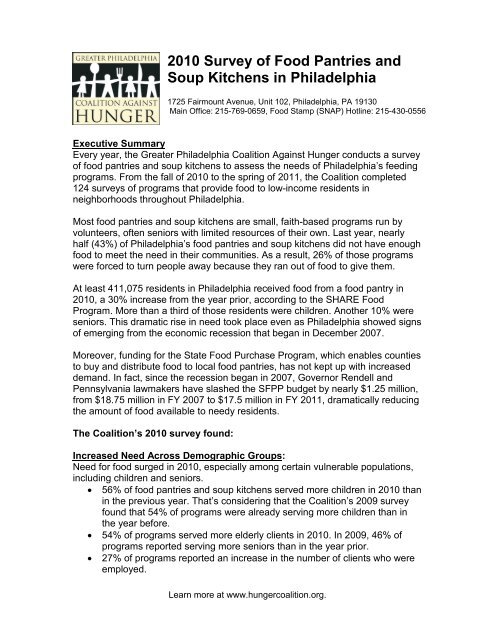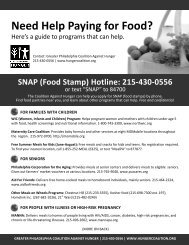2010 Survey of Food Pantries and Soup Kitchens in Philadelphia
2010 Survey of Food Pantries and Soup Kitchens in Philadelphia
2010 Survey of Food Pantries and Soup Kitchens in Philadelphia
You also want an ePaper? Increase the reach of your titles
YUMPU automatically turns print PDFs into web optimized ePapers that Google loves.
<strong>2010</strong> <strong>Survey</strong> <strong>of</strong> <strong>Food</strong> <strong>Pantries</strong> <strong>and</strong><br />
<strong>Soup</strong> <strong>Kitchens</strong> <strong>in</strong> <strong>Philadelphia</strong><br />
1725 Fairmount Avenue, Unit 102, <strong>Philadelphia</strong>, PA 19130<br />
Ma<strong>in</strong> Office: 215-769-0659, <strong>Food</strong> Stamp (SNAP) Hotl<strong>in</strong>e: 215-430-0556<br />
Executive Summary<br />
Every year, the Greater <strong>Philadelphia</strong> Coalition Aga<strong>in</strong>st Hunger conducts a survey<br />
<strong>of</strong> food pantries <strong>and</strong> soup kitchens to assess the needs <strong>of</strong> <strong>Philadelphia</strong>’s feed<strong>in</strong>g<br />
programs. From the fall <strong>of</strong> <strong>2010</strong> to the spr<strong>in</strong>g <strong>of</strong> 2011, the Coalition completed<br />
124 surveys <strong>of</strong> programs that provide food to low-<strong>in</strong>come residents <strong>in</strong><br />
neighborhoods throughout <strong>Philadelphia</strong>.<br />
Most food pantries <strong>and</strong> soup kitchens are small, faith-based programs run by<br />
volunteers, <strong>of</strong>ten seniors with limited resources <strong>of</strong> their own. Last year, nearly<br />
half (43%) <strong>of</strong> <strong>Philadelphia</strong>’s food pantries <strong>and</strong> soup kitchens did not have enough<br />
food to meet the need <strong>in</strong> their communities. As a result, 26% <strong>of</strong> those programs<br />
were forced to turn people away because they ran out <strong>of</strong> food to give them.<br />
At least 411,075 residents <strong>in</strong> <strong>Philadelphia</strong> received food from a food pantry <strong>in</strong><br />
<strong>2010</strong>, a 30% <strong>in</strong>crease from the year prior, accord<strong>in</strong>g to the SHARE <strong>Food</strong><br />
Program. More than a third <strong>of</strong> those residents were children. Another 10% were<br />
seniors. This dramatic rise <strong>in</strong> need took place even as <strong>Philadelphia</strong> showed signs<br />
<strong>of</strong> emerg<strong>in</strong>g from the economic recession that began <strong>in</strong> December 2007.<br />
Moreover, fund<strong>in</strong>g for the State <strong>Food</strong> Purchase Program, which enables counties<br />
to buy <strong>and</strong> distribute food to local food pantries, has not kept up with <strong>in</strong>creased<br />
dem<strong>and</strong>. In fact, s<strong>in</strong>ce the recession began <strong>in</strong> 2007, Governor Rendell <strong>and</strong><br />
Pennsylvania lawmakers have slashed the SFPP budget by nearly $1.25 million,<br />
from $18.75 million <strong>in</strong> FY 2007 to $17.5 million <strong>in</strong> FY 2011, dramatically reduc<strong>in</strong>g<br />
the amount <strong>of</strong> food available to needy residents.<br />
The Coalition’s <strong>2010</strong> survey found:<br />
Increased Need Across Demographic Groups:<br />
Need for food surged <strong>in</strong> <strong>2010</strong>, especially among certa<strong>in</strong> vulnerable populations,<br />
<strong>in</strong>clud<strong>in</strong>g children <strong>and</strong> seniors.<br />
• 56% <strong>of</strong> food pantries <strong>and</strong> soup kitchens served more children <strong>in</strong> <strong>2010</strong> than<br />
<strong>in</strong> the previous year. That’s consider<strong>in</strong>g that the Coalition’s 2009 survey<br />
found that 54% <strong>of</strong> programs were already serv<strong>in</strong>g more children than <strong>in</strong><br />
the year before.<br />
• 54% <strong>of</strong> programs served more elderly clients <strong>in</strong> <strong>2010</strong>. In 2009, 46% <strong>of</strong><br />
programs reported serv<strong>in</strong>g more seniors than <strong>in</strong> the year prior.<br />
• 27% <strong>of</strong> programs reported an <strong>in</strong>crease <strong>in</strong> the number <strong>of</strong> clients who were<br />
employed.<br />
Learn more at www.hungercoalition.org.
Insufficient Resources <strong>and</strong> Personal Sacrifices:<br />
Nearly half (43%) <strong>of</strong> programs did not have enough food to meet dem<strong>and</strong>.<br />
• 26% <strong>of</strong> food pantries <strong>and</strong> soup kitchens turned people away because they<br />
did not have enough food to give them.<br />
• 43% had to cut back on the amount <strong>of</strong> food they distributed per client.<br />
• 76% <strong>of</strong> food pantry <strong>and</strong> soup kitchen coord<strong>in</strong>ators responded that they<br />
spend their personal money on the programs they run.<br />
Concern about Clients’ Health <strong>and</strong> Nutrition:<br />
More food pantries <strong>and</strong> soup kitchens (83%) want to improve the nutritional<br />
quality <strong>of</strong> the food they serve. When asked how best to accomplish that goal:<br />
• 70% said their program would need more fruits <strong>and</strong> vegetables.<br />
• 63% wanted more nutritious canned <strong>and</strong> dried food.<br />
• 42% wanted nutrition education for their clients.<br />
• 37% wanted nutrition education for their staff <strong>and</strong> volunteers.<br />
Increased Will<strong>in</strong>gness to Work Together:<br />
More than half (52%) <strong>of</strong> programs either know <strong>of</strong> or work with other feed<strong>in</strong>g<br />
programs <strong>in</strong> their area. That’s up from just 31% <strong>of</strong> programs <strong>in</strong> 2009, when the<br />
Coalition founded the Victory <strong>in</strong> Partnership (VIP) Project to network food<br />
pantries <strong>and</strong> soup kitchens with<strong>in</strong> their communities.<br />
Learn more at www.hungercoalition.org.



